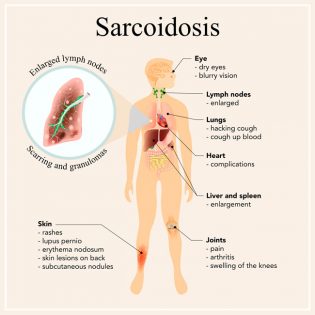Sarcoidosis
What is sarcoidosis?
— Sarcoidosis is a disorder that causes clusters of abnormal tissue to form in the body. These clusters are called “granulomas.” If many granulomas form in an organ, they can keep the organ from working normally. For example, granulomas can form in the lungs and cause breathing problems. Sarcoidosis can affect many different organs. Often it affects the lungs, but it can also affect the skin, eyes, nose, and lots of other body parts.What are the symptoms of sarcoidosis?
— Sarcoidosis causes different symptoms depending on which body part it affects. Often the symptoms are mild and go away on their own. When it affects the lungs, sarcoidosis can cause:- Cough
- Trouble breathing
- Chest pain
- Tiredness or weakness
- Fever
- Weight loss
How do I know if I have sarcoidosis?
— There is no single “test” that can tell if you have sarcoidosis. To diagnose it, doctors and nurses look at:- Your symptoms and your physical exam
- X-rays (or special X-rays called CT scans)
- Lab work on tissue taken from your body (called a biopsy)
- Tests that can rule out other causes of your condition

